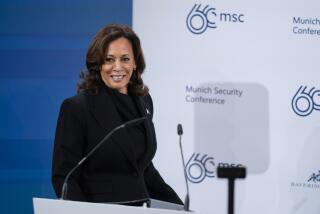Albright Warns Against U.S. Isolationism
- Share via
HOUSTON — Secretary of State Madeleine Albright, launching a concerted drive to regain public support for U.S. foreign policy and the money to pay for it, said Friday that the gravest dangers facing the United States in the closing years of the century are isolation and indifference.
Albright, new in her post, struck two main themes in her first official trip outside Washington, asserting that foreign relations are too important to become bogged down in partisan bickering and arguing that events around the world affect the daily lives of Americans whether they like it or not.
“In our democracy, we cannot pursue policies abroad that are not understood and supported at home,” she said in a speech at a Rice University think tank founded by James A. Baker III, secretary of state in the George Bush administration. “The greatest danger to America is not some foreign enemy. It is the possibility that . . . we will succumb to the temptation of isolation, neglect the military and diplomatic resources that keep us strong, and forget the fundamental lesson of this century, which is that problems abroad, if left unattended, will all too often come home to America.”
Everything on Albright’s schedule Friday was there for its symbolism. By visiting an American city before embarking on a round-the-world trip next week, the nation’s top diplomat underscored the importance of public support for the administration’s foreign policy.
And before her speech, Albright met with Mexican Foreign Minister Jose Angel Gurria Trevino for one hour, time she called “a symbol of the depth and importance of the [U.S.-Mexico] relationship.”
Albright’s first stop in Houston was at the passport agency, where she took a brief turn at pushing computer buttons to issue a completed passport. State Department spokesman Nicholas Burns said this stop was intended to underline the activity that brings the State Department closest to the public.
She also visited a Houston high school, where she told honors students: “What I am doing, with the help of my colleagues, is getting the world ready for you.”
Albright urged students to take an interest in foreign affairs, assuring them they would find the issues “not only cool but awesome.”
Despite her focus on bipartisanship, Albright emphasized two issues that have drawn sharp opposition from Republicans on Capitol Hill: the administration’s request for Congress to pay off Washington’s debt to the United Nations and other international organizations and its call for ratification of a treaty outlawing chemical weapons.
“We owe about $1 billion to the U.N. and other organizations and almost another $1 billion to the multilateral banks,” she said. “These debts hurt America. They erode the capacity of these organizations to carry out programs that serve our interests. They undermine proposals we have made for reform. And, to those around the world who are hostile to our leadership, they are an open invitation to run America into the ground.”
Albright said the chemical weapons treaty, negotiated in the Ronald Reagan and Bush administrations, will take effect April 29 whether or not the United States ratifies it because it has already been approved by enough other nations.
But, she said, unless the United States ratifies the treaty soon, it will be denied a seat on the panel that will enforce it. U.S. chemical companies also would be subject to restrictions on exports.
Congressional opponents, led by Senate Foreign Relations Committee Chairman Jesse Helms (R-N.C.), have said the treaty is useless because rogue states such as Libya and Iraq will not join the compact and because violations of the treaty will be rampant.
Albright said she regrets that some nations will not sign or adhere to the accord but argued that the treaty “remains very much in our interest.”
“Are we barred from establishing any rule that the outlaw nations do not first accept?” she asked. “Or does it serve our interests to draw the clearest possible distinction in law between those who observe international standards and those who do not?”
More to Read
Sign up for Essential California
The most important California stories and recommendations in your inbox every morning.
You may occasionally receive promotional content from the Los Angeles Times.













